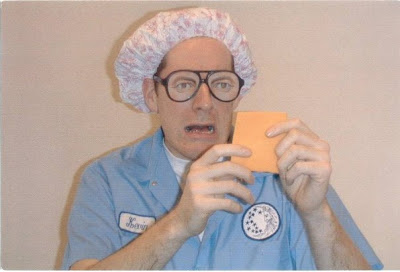 |
| Kevin Maher is LONE DRIFTER |
Recently I was
profiled as a star of “new vaudeville” — which is a very nice thing to say. Most anyone who visits this site is probably more familiar with my “geek out” theme nights and writings on popular culture. (Or you came here searching for
images of Soleil Moon Frye.)
But I started as a solo-comedy artist (aka an “alternative comedian”)
Today’s entry will look back my 2001 solo show LONE DRIFTER. (see below, there’s video and photos.)
But first, I need to talk about two New York City institutions that were essential to my development:
Both spaces fulfilled New York’s promise of the possibility of theater. I’m not one to romanticized my past, but I saw and participated in some one-of-a-kind shows at those spaces. And I’d hate to think of what my youth would’ve been like without them.
Today the UNDER St. Marks needs your help. Learn more
here.
As for my show, I set out to do an anti-one-man show. I wanted to skewer the cliches and present sketch comedy bits with the gravitas of legit theatre.
Some of the pieces were grotesque pseudo-psycho monologues in the spirit of Jim Thompson novels. Many of the characters were decidedly not “likable” (probably not the best approach for a new comedian), I followed Joe Coleman’s approach to painting — he said every grotesque image is a self-portrait, he finds himself in each one. (see below) I tried to do the same with my comedy.
The theme was “loners” — I played a lot of desperate people at the end of their respective ropes. The press release called it “a pride parade of shut-ins, swillbillies and loners.” Someone had told me that Alan Bennet wrote his monologues to chart a significant moment when a character changes his/her life. My show was about the people I grew up with: people incapable of change. They might talk about losing weight or quitting smoking or getting out, but they were stuck in one place.
I also played a fugitive John Wayne robot, on the run after being framed for a crime he didn’t commit.
My director, Jeff Eyres, made sure the show was always funny. That was the guiding principle: get laffs. That would be the ultimate fuck-you to bad theater, right?
We also wanted the show to play like a Ramones record: 27 characters in 50 minutes. It was a whirlwind of comedy that played like emotional fireworks and ended before anybody could get bored.
(As the show evolved it got away from “drama-y” bits and included more non-character routines and me doing comedic routines. The final version of the show featured a guy pooping out a giant bag of cocaine.)
At the time I did this show, I got to perform it in a couple of festivals and high-profile venues. A handful of critics saw it and said nice things, like comparing me to Ernie Kovacs (!), and some audience members saw it as modern day Frank Gorshin or Jonathan Winters routines.
The show was briefly developed as a TV special, as a collection of short films loosely tied together. Because a TV producer saw it and understood that each piece worked as a short film.
Here’s the trailer. I don’t think this was ever shown anywhere. Also, it features a lot of the loudest moments. There were quiet parts, too. One audience favorite was a whispered piece about a guy smoking pot in the parking lot at his brother’s wedding, where he steals the cake-topper to play God. That didn’t make it into this “sales tape.”
(Not seen in the tape: my monologues as “Juiceman” the guy who could lactate prune-juice, a darkened scene as a trucker who gets killed by Pumpkinhead, and my impression of the Kool-Aid man getting laid.)
I had plans to do a couple of follow-up shows, including PINK ELEPHANTS (more comedy bits and a live slideshow about an alien invasion), ATLANTIC CITY TERMINAL (a multi-character one-man show/murder mystery set in A.C.), I ATE TOO MUCH HAM AND OTHER SAD STORIES (more character monologues.) But for various reasons those shows never came to be.
Instead I wrote a one-man play called HANDS ON A CAN OF BEANS, which followed a small-town competition to win a lifetime supply of van de kamp’s beans. I saw this as being my mainstream show. Instead, agents told me not to play women or old men or mythical rollercoaster gods. (One agent also suggested I take her class on how to do a one-person show.) I was also instructed to cultivate my “type” and regularly play the kinds of roles that I would audition for. I should treat a one-man show like a live-action pilot for my sitcom. I never did get around to writing that show, either.
I will probably never work as hard (or with as much focus) as I did on LONE DRIFTER.
I feel like I had a lot more to say about this show. Doing a one-person show teaches you all kinds of things you didn’t know about yourself — both the writing, the performance, and how you react to the reactions. I learned a lot about myself — and I’m glad spaces like UNDER St. Marks and Surf Reality gave people a place to experiment and produce truly independent theater.
related links:
Lone Drifter was a piece of independent theatre, but it also had funding from
Consolidated Baily.








Ritch
Love this post.
Not sure how I missed this show- I was likely neck deep in JEST stuff at the time.
Also love the Kirchberger laugh at the 4:27 mark.